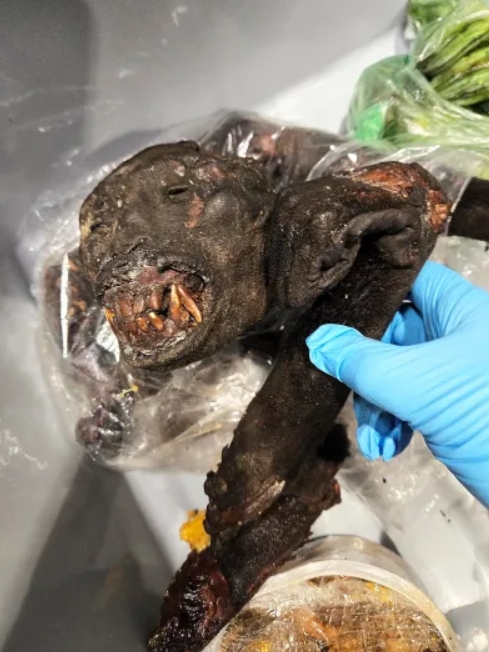U.S. Customs and Border Protection officers intercepted two separate shipments of bushmeat at Detroit Metropolitan Airport last month, including one haul of primate meat, in seizures officials say highlight the dangers of disease entering the United States.
Bushmeat—defined by U.S. health agencies as meat from wild animals such as bats, monkeys, and cane rats—is illegal to import into the country.
CBPOps and DFODetroit announced the discoveries Saturday in a joint post on Instagram, writing, “Scary!!! @DFODetroit CBP agriculture specialists intercepted back-to-back bushmeat at @DTWShots. Bushmeat poses serious risks to public health and violates federal regulations. CBP remains vigilant in protecting our borders and communities. #OFOProud🇺🇸 #CBP #OFO #ProtectingAgriculture #NationalSecurity.”
According to a press release issued August 20, CBP agriculture specialists discovered 11 pounds of rodent meat from Togo in one baggage examination and 52 pounds of primate meat—declared as antelope—days later in luggage arriving from Gabon. Both travelers also carried undeclared agricultural items. The seized meat was turned over to the Centers for Disease Control and Prevention, and each passenger was fined $300 for failing to declare it.

CBP PHOTO – U.S. Customs and Border Protection agriculture specialists encountered potentially disease-ridden bushmeat twice within one week at Detroit Metropolitan Airport.
“These recent bushmeat interceptions are significant in bringing attention to the illegal importation of bushmeat through our ports of entry,” Port Director Fadia Pastilong said in the statement. “This also showcases how we work with our partner agencies to prevent a potential disease outbreak.”
A 2024 entry on the CDC website warns that bushmeat can carry pathogens, including orthoebolaviruses, the family of viruses that cause Ebola. Importing any amount of bushmeat can result in seizure and fines of up to $250,000. While the CDC notes there have been no reported cases of Americans contracting disease from confiscated bushmeat, it stresses that the risk is serious.
Researchers have long pointed to the dangers. A 2019 Penn State report found that bushmeat samples from the Serengeti contained bacteria linked to anthrax, brucellosis, and Q fever.
The International Fund for Animal Welfare said in 2022 that demand for bushmeat in cities and abroad, including in Europe and North America, fuels a global industry and threatens both biodiversity and human health. The group cited estimates that five tons of wild animal meat are smuggled through Paris’s Charles de Gaulle Airport each week.
Nevertheless, bushmeat is an essential element of West African diets. One study estimated that in some regions, bushmeat constitutes 80–90% of animal protein intake.
CBP officials in Detroit said that while rodent-type bushmeat is intercepted sporadically, primate meat seizures are rare. They cautioned that consumption of bushmeat in parts of Africa, where it is sometimes eaten raw or minimally processed, heightens the risk of diseases like Ebola and mpox spreading to new populations.
“We routinely find various agriculture items and oddities—live giant snails, animal skulls, and exotic food items—but most times it’s not a malicious act,” said Director of Field Operations Marty C. Raybon. “Despite this, it’s our duty to protect the homeland and preventing certain food and animal products from entering the U.S. is essential to public health.”


